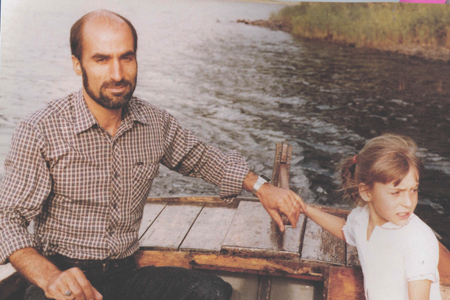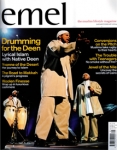
Kith & Kin
Issue 3 Jan / Feb 2004
words Tiia Haataja
Javed Hakim is the proud father of four children. Originally from Iran, he lives in England with his English-born wife. Julieann Maryam Hakim is Javad’s oldest daughter. Tiia Haataja talks to father and daughter about the past, present and the future.
Javad: My father and my grandfather were both in medicine and that is what I also initially wanted to do. I had a chance to study in India or England. I was very unsure about what choice to make so I went to talk to a scholar who was famous in istikhara (a special prayer seeking God’s guidance). When I told him of my plans, he told me that if I went to India I would die on this trip! I was shocked and decided I had better stay in Iran. When asking the scholar if that was the right thing to do, I was advised to go to England.
The imam explained to me that this trip would be bountiful, like a young tree that would have many blossoming branches – exactly how I have it now with my wife and children. I met my wife when I was at college in the UK. We were married shortly after in the Islamic way. I then went alone to Iran to tell my family. I was nervous about their reaction, yet somehow my niece guessed I was married before I even brought up the subject. My mother simply said that if I am happy, she is happy.
Her only advice was nebver to lose my religion. In Iran we believe that if you respect and listen to your parents you will have a successful life. I am sure that whatever success I have had has been because of my late father and my late mother’s prayers for me.
When Juliann’s mother and I got married we faced a lot of hardship. I was a student and we were struggling financially. Nobody thought our marriage would last because there seemed to be so many obstacles. It also did not make things easier when one of my lecturers was racist and I had to change my university.
“Julieann was a perceptive child although it was not easy for her to be caught between two cultures.”
Julieann: was a perceptive child although it was not easy for her to be caught between two cultures. I would tell her stories about Iran and our hertigae and I suppose you could say she was politicsed from an early age, growing up against the backdrop of the Islamic revolution and the fall of the Shah. My wife was also developing her own sense of Islam so Julieann grew up in an atmosphere of constant philosophical and religious discussions.
I always told her that she was different from other children in her school. We wanted her to develop a strong identity of her own. At that time she was the only Muslim in her school. I was extremely proud when Julieann went to university. During the second year of her studies she moved into student accommodation.
It was very emotional when she left but she is a wise girl and I knew I did not have to worry about her. It turned out to be one of the best things she ever did- her housemates included an Iraqi, an Indian and two Pakistanis who were all very positive influences on her. Before, she had been living in a small town being the only different child. Now she had people to relate to as a Muslim.
Her childhood was not always the easiest one, but my wife and I would always strive to give her a solid foundation, which she could build upon. I think because of those confusing and hard times she has become the strong, independent personality that she is. I always said to her that whatever she would do, her brother and sisters would reflect her. And what an extraordinary example she has been to them.
Julieann: I love both of my parents dearly. My father was always involved in my childhood.
I remember when I went to school my parents told the teachers that I could not go to assembly of participate in any other activities that were not part of my faith. When you are young sometimes you just want to fit in and so being the only one who did not attend assembly would draw unwanted curiosity from the other children. But my father always taught me never to be ashamed of being different. He used to give me examples of hardships that the Prophet Muhammad faced. When other children asked why I didn’t have to go to assembly, I proudly told them that it was because I was a Muslim. As soon as they heard that everyone wanted to be a Muslim!
At school we had to wear the uniform and for girls it meant wearing a skirt. My father insisted I should wear trousers, so I ended up wearing both. And you can believe that was a sight. Some children then asked me if I was from Pakistan and I found it frustrating that nobody could understand that I was Iranian.
My parents had it really hard when I was young and we lived with my mother’s parents for a short time to save money. This is why I am known as Julieann, not Maryam, because my grandparents preferred it. This didn’t do much for my father’s self esteem as he felt he was letting us down by not providing us with our own home.
However, the experience taught me not to take money for granted. My father would remind me not to ask for things inside shops because money was so tight and he didn’t want to be embarrassed. Once, when I was about six, we went shopping. I sat in the trolley and asked him to push it in a certain direction.
Then he noticed that we ended up in the toy section. I asked if he thought the dolls were nice. Because I had been taught manners but was a smart child, instead of asking him to buy me one, I asked if he would like to have money to buy me one. That story always makes my father smile.
I remember when my father had to change his university after his first year because on of his lecturers was making life difficult for him. He would travel to Manchester to study in the week and always took the last train possible so he could spend as much time with us as he could. I could not wait for him to come home at the weekend when we would all go into town to do some window-shopping and eat kebabs.
Those weekends were very special.
As a teenager I began to stretch my wings a little and this on occasion brought me into conflict with my father. As the first-born, this was inevitable and my mother has always said that I was a mirror for my brother and sisters. They have it easier as they are much younger than me and my parents have mellowed. Eventually I went to university and the funny thing was that my father went to the same university to do his Masters.
Now I live and work in London. I know that my parents are proud of me and I have them to thank for my achievements in life: they are the ones who made me what I am. They brought me up to respect two different cultures and to cherish my religion. I hope to spend time in Iran to learn more about my father’s roots. We go often, and I really like the lifestyle out there. I would miss my family, but I know it would only bring us closer.
Bookmark this |
|
Add to DIGG |
|
Add to del.icio.us |
|
Stumble this |
|
Share on Facebook |
|
Share this |
|
Send to a Friend |
|
Link to this |
|
Printer Friendly |
|
Print in plain text |
|


Comments
0 Comments